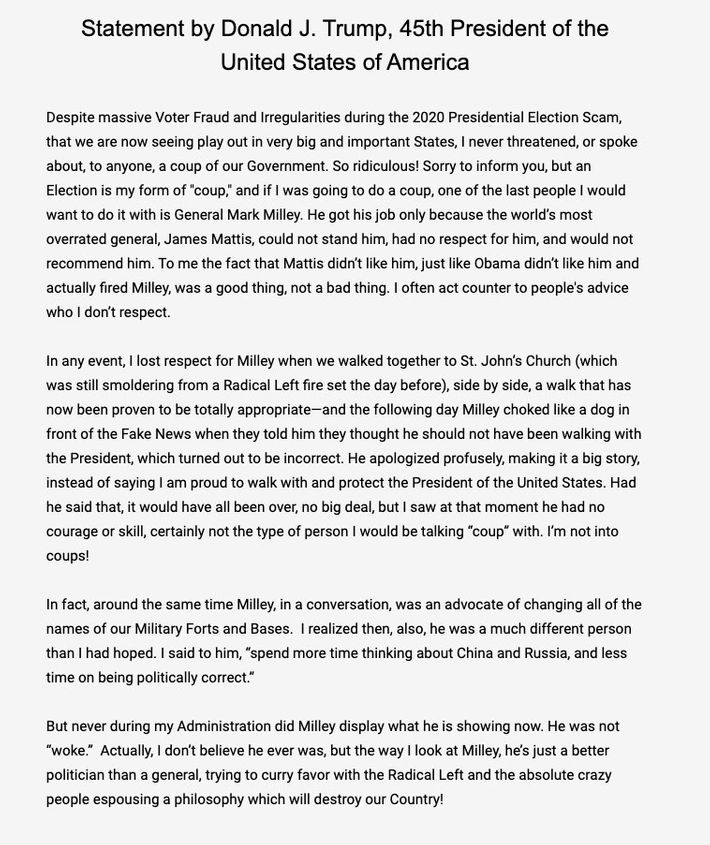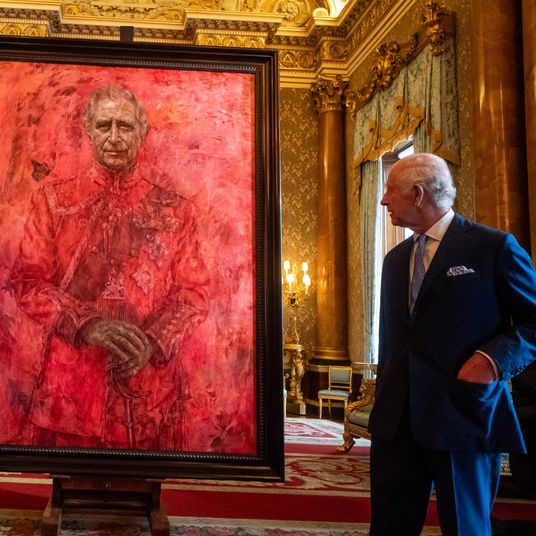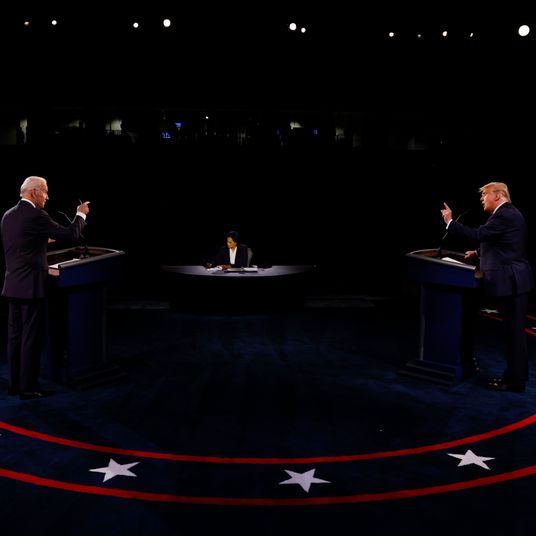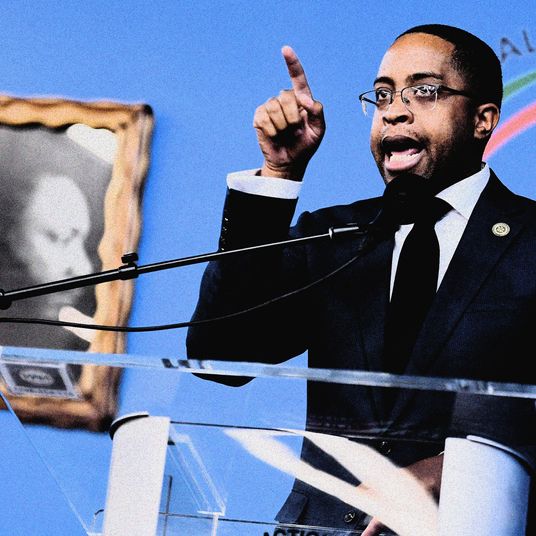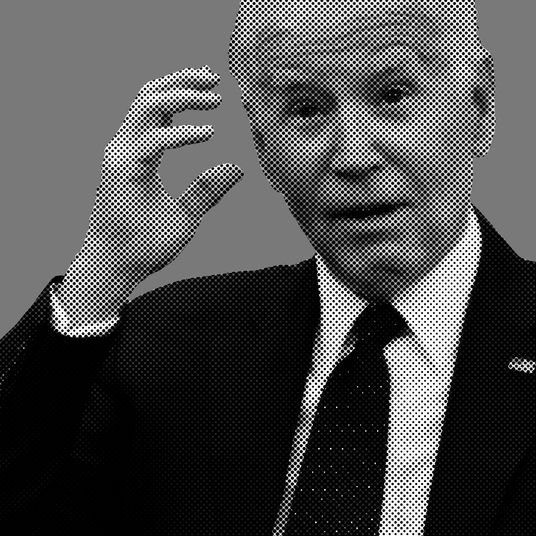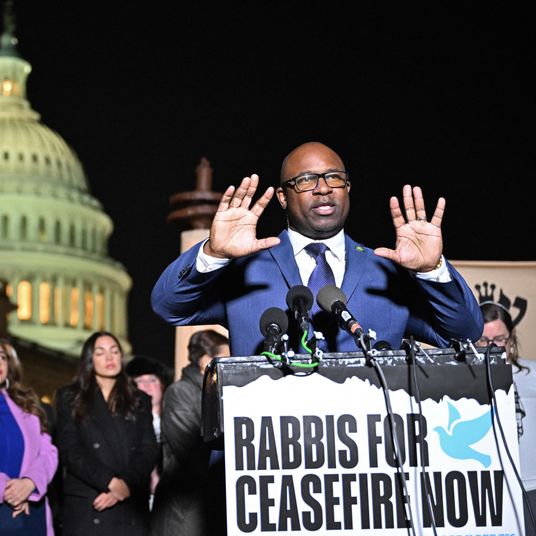I Alone Can Fix It, the new Donald Trump book by Carol Leonnig and Philip Rucker, quotes Joint Chiefs of Staff chairman Mark Milley repeatedly likening his boss to Adolph Hitler, and recounting his belief that he needed to use his position in the military to prevent a coup.
Trump has released a statement denying the latter. Sort of:
The former president makes three main points in his rejoinder to Milley. First, he calls Milley a terrible hiring choice by Donald Trump, which is a claim Trump has made about many of his hires. In this instance, Trump takes the extra step and explains why he is so bad at hiring people: He only hired Milley because Milley was hated by another terrible Trump hire.
I have never managed a large organization, but I am pretty confident that hiring people to extremely high level positions out of spite is generally not a sound approach to talent acquisition. It’s also worth reiterating that hiring quality staff is an extremely important aspect of the president’s job, and Trump’s repeated boasts that he does this aspect the the job miserably seems almost like an admission of disqualification.
Second, Trump praises the Lafayette Square massacre, when police attacked peaceful protesters who had gathered in a public space, and describes Milley’s regret over the episode as proof Milley was not made of the kind of stuff Trump demands in that job.
Third, he asserts, “If I was going to do a coup, one of the last people I would want to do it with is General Mark Milley.” This point follows from the previous two: Trump complains that he did a bad job of hiring generals who would be the sort of people to carry out a military coup.
All these points confirm rather than refute Milley’s suggestion that Trump posed a threat to the republic, and Miley stood in the way.
Oddly enough, Trump does not respond to Milley’s reported comments that he had been “the gospel of the Führer,” planning a “Reichstag fire,” and so on. Those comments do seem to fit a pattern.
Let’s begin with the obvious premise that Donald Trump is not Hitler, has never been Hitler, and, even under the most grim possible scenario, never will be Hitler. We can imagine many terrifying outcomes, including a Trump resurgence that ends America’s democratic experiment, that fall well short of a world war and industrialized genocide. History has produced many racist leaders who hate democracy. Only one of them perpetrated as much destruction as Hitler.
That said, it is quite striking how frequently the Hitler comparison comes up with regard to Trump — not by his enemies, but by members of his own inner circle. Matthis has implicitly likened Trump’s beliefs to Nazi methods:
Instructions given by the military departments to our troops before the Normandy invasion reminded soldiers that “The Nazi slogan for destroying us … was ‘Divide and Conquer.’ Our American answer is ‘In Union there is Strength.’” We must summon that unity to surmount this crisis — confident that we are better than our politics.
Donald Trump is the first president in my lifetime who does not try to unite the American people — does not even pretend to try.
John Kelly, Trump’s former chief of staff, recalled that Trump told him, “Well, Hitler did a lot of good things,” and persisted in this after encountering pushback.
Trump is not Hitler, but there is probably a negative correlation between the quality of a president’s leadership and the number of his advisers whom he reminds of Hitler.
Trump’s second wife reportedly told her lawyer that Trump kept a book of Hitler’s speeches near his bed. Trump’s reported denial at the time had a curious ring: “If, I had these speeches, and I am not saying that I do, I would never read them.” Indeed, Trump has a point: It stretches plausibility to believe he would read a book of any kind.
Still, there’s that same sentence construction. If I owned a Hitler book. If I was planning a coup.


